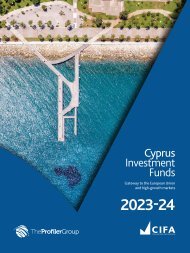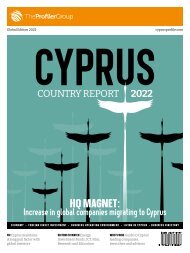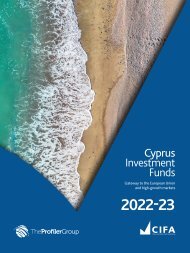2020 Cyprus Country Report
The 2020 Cyprus Country Report features in-depth articles on the economy, foreign direct investment, international trade and headquartering as well as detailed sector profiles and insights from Cyprus’ 100 most influential political, economic and business leaders shaping the future of their country and its industries.
The 2020 Cyprus Country Report features in-depth articles on the economy, foreign direct investment, international trade and headquartering as well as detailed sector profiles and insights from Cyprus’ 100 most influential political, economic and business leaders shaping the future of their country and its industries.
Create successful ePaper yourself
Turn your PDF publications into a flip-book with our unique Google optimized e-Paper software.
Business Operating Environment<br />
Legal and Regulatory Framework<br />
<strong>Cyprus</strong>’ legal framework is particularly strong, due in part to mandatory compliance<br />
with European Union regulations. The legislation governing <strong>Cyprus</strong>’ financial services<br />
sector underpins the island’s ambition to become a leading international financial<br />
centre. As a former British colony, <strong>Cyprus</strong> law is based on English Common Law<br />
and was amended in recent years to meet European Union requirements. Offering<br />
foreign businesses a familiar and reliable framework within which to operate, the<br />
island’s legal and regulatory system is considered to be one of the most favourable<br />
in Europe, whilst at the same time being fully compliant with the EU, the Financial<br />
Action Task Force on Money Laundering (FATF), the Organization for Economic<br />
Co-operation and Development (OECD) and the Financial Stability Forum.<br />
Regulators<br />
and Authorities<br />
Financial institutions are<br />
regulated and supervised by<br />
three authorities in <strong>Cyprus</strong>:<br />
the Central Bank of <strong>Cyprus</strong><br />
(CBC), which is responsible for<br />
the supervision of commercial<br />
banks and the cooperative<br />
credit institutions; the<br />
Superintendent for Insurance<br />
Control (SI); and the <strong>Cyprus</strong><br />
Securities and Exchange<br />
Commission (CySEC).<br />
However, changes introduced<br />
by the EU’s Single Supervisory<br />
Mechanism (SSM) in 2014,<br />
saw the transfer of supervision<br />
of all the eurozone’s largest<br />
banks to the European Central<br />
Bank (ECB). For <strong>Cyprus</strong>,<br />
this meant that Bank of<br />
<strong>Cyprus</strong>, Hellenic Bank and<br />
RCB Bank were transferred<br />
from the supervision of<br />
the CBC to the ECB.<br />
Taxation<br />
<strong>Cyprus</strong> offers one of the<br />
most attractive tax regimes<br />
in Europe. A member of the<br />
European Union since 2004,<br />
<strong>Cyprus</strong>’ regulatory regime is<br />
in full compliance with the<br />
requirements of the EU and<br />
OECD. <strong>Cyprus</strong> has one of<br />
the lowest EU corporate tax<br />
rates at 12.5%. The island’s<br />
advantageous tax rate coupled<br />
with an extensive list of double<br />
tax treaties places it high on the<br />
list of preferred jurisdictions<br />
for international tax planners.<br />
Anti-Money Laundering<br />
<strong>Cyprus</strong> has put in place all necessary<br />
mechanisms for the prevention and suppression<br />
of money laundering and terrorist financing<br />
activities. Cypriot authorities cooperate with<br />
foreign supervisory authorities in compliance<br />
with the Financial Action Task Force (FATF)<br />
recommendations to ensure financial sector<br />
legislation and practices are aligned with<br />
international standards. The national AML<br />
law is fully aligned with the 4th EU Anti-<br />
Money Laundering Directive, and <strong>Cyprus</strong> is<br />
in full adherence with sanctions issued by the<br />
European Union, the United Nations, and also<br />
the US Treasury OFAC. The transposition<br />
of the 5th EU AML Directive into Law took<br />
place in September 2019, whereas the full<br />
functionality of the Ultimate Beneficial<br />
Owner (UBO) registries will be available<br />
from March <strong>2020</strong>. All individuals and legal<br />
entities that perform financial and other<br />
business activities, are obliged to protect<br />
themselves, their companies and the financial<br />
system of <strong>Cyprus</strong> from money laundering by<br />
setting standard procedures and adhering to<br />
strict protocols for maintaining records.<br />
Corporation Tax<br />
The Corporation Tax Rate: 12.5%.<br />
Basis of taxation<br />
All companies that are tax residents of<br />
<strong>Cyprus</strong> are taxed on their income accrued<br />
or derived from all sources in <strong>Cyprus</strong> and<br />
abroad. A non-<strong>Cyprus</strong> tax resident company<br />
is taxed on income accrued or derived<br />
from a business activity which is carried<br />
out through a permanent establishment<br />
in <strong>Cyprus</strong> and on certain income arising<br />
from sources in <strong>Cyprus</strong>. A company is<br />
considered tax resident of <strong>Cyprus</strong> if it is<br />
managed and controlled from <strong>Cyprus</strong>.<br />
Special Types of Companies<br />
SHIPPING COMPANIES<br />
The Merchant Shipping Legislation, fully<br />
approved by the EU, provides for an<br />
exemption from all direct taxes and taxation<br />
under tonnage tax regime. The merchant<br />
shipping legislation applies to qualifying<br />
shipowners, charterers and ship managers,<br />
which are involved with the operation of<br />
qualifying community ships (ships under<br />
a CY flag or a flag of an EU member state<br />
or of a country in the European Economic<br />
Area) and foreign (non-community) ships<br />
(under conditions) and provided that they<br />
engage in qualifying activities. The legislation<br />
allows non community vessels to enter<br />
the tonnage tax regime provided the fleet<br />
is composed of at least 60% community<br />
vessels. If this requirement is not met, then<br />
non-community vessels can still qualify<br />
if certain criteria are met. Exemption is<br />
also given in relation to the salaries of<br />
officers and crew aboard a <strong>Cyprus</strong> ship.<br />
INSURANCE COMPANIES<br />
Profits of insurance companies are liable<br />
to corporation tax similar to all other<br />
companies except in the case where the<br />
corporation tax payable on taxable profit of<br />
life insurance business is less than 1.5% of<br />
the gross premium. In this case the difference<br />
is paid as additional corporation tax.<br />
154 <strong>Country</strong> <strong>Report</strong> CYPRUS <strong>2020</strong>

















